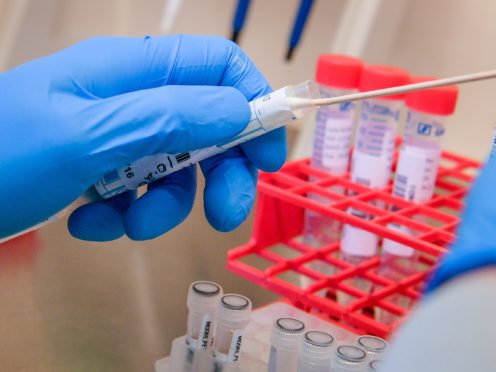The newly announced task force set up by the Government is seeking to find a vaccine for Covid-19 in double-quick time, but what will it involve and how does it work?
Here’s what you need to know about vaccination.
– What is a vaccine?
Vaccines are a means of “teaching” the body to respond to a particular disease by introducing a virus in a weakened live state or a killed state.
It prompts the body to produce antibodies to fight the disease, meaning it is ready to protect itself if it ever encounters the virus naturally.
– Why is it so important that we have a vaccine?
A mass vaccination programme is likely to be a vital part of ending the lockdown strategy, as Covid-19 is now so widespread it will be almost impossible to eradicate it through quarantine and treatment.
It will allow the Government to safely lift social distancing measures for everyone as those who have not caught the disease will be protected.
It can also generate herd immunity, because if enough people are vaccinated it is much more difficult for the virus to jump from host to host.
– Will a vaccine work?
The NHS estimates mass vaccination programmes save about three million lives every year and have virtually wiped out diseases such as smallpox, tetanus and polio.
But reluctance among some people to vaccinate their children has led to a resurgence in diseases such as measles and mumps in England, which had all but disappeared.
– What is the new task force?
The task force is a co-ordinated effort between 21 different research projects looking into different vaccine possibilities that has just been handed a £14 million funding pot by the Government.
Some of the projects are looking at ways to fast-track clinical trials in humans – often one of the longest phases of the process.
The Government is also reviewing current vaccine regulations to see if they can be relaxed or amended to speed up regulatory approval.
– What trials are being done?
We're thrilled to announce that five of our #Covid19 projects have just received funding from @UKRI_News, enabling us to continue valuable work in areas such as drug testing & studies of infectious disease immunity – read more at https://t.co/UsFI1FvPb2 pic.twitter.com/5S98qG0nda
— Oxford University (@UniofOxford) April 17, 2020
Imperial College London is working on a vaccine that would prompt the body to produce higher volumes of the protective antibodies that fight the disease.
Public Health England (PHE) is researching an antibody that could protect against infection or slow the progression of the illness in those already affected.
Elsewhere, the University of Oxford will soon trial an anti-malarial drug believed to have anti-inflammatory properties that could reduce the symptoms of Covid-19 in high-risk groups.
It could potentially reduce their need for hospital treatment and speed up recovery.
– When will we have a vaccine?
Scientists at the University of Oxford said previously they believed a vaccine could be available for use by the general public in September instead of the usual one to two years.
Sarah Gilbert, a professor of vaccinology at the university, and her team have already created a potential vaccine that is shortly due to begin human trials.
But she warned there is always an unknown and scientists can never be sure that vaccines are going to work.
The World Health Organisation has also said the world “can’t wait” for a Covid-19 vaccine to become available before lifting lockdown measures.
This sentiment is echoed by NHS national medical director Professor Stephen Powis.
He said last week: “Vaccines take months to develop, we need to make sure that they are safe and effective, and then of course they need to be manufactured and deployed.
“Vaccines are not the only part of an exit strategy.”
– What problems do we face?
As well as the development and testing phase, one of the limiting factors is the UK’s manufacturing capacity.
Professor Adrian Hill, director of the Jenner Institute at the university, estimates we will need “hundreds of millions of doses, ideally by the end of this year” to finally get the pandemic under control.
The new task force is working with the BioIndustry Association and the pharmaceutical companies to accelerate the manufacture of a vaccine.
